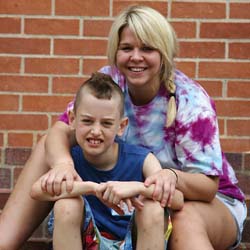By Amanda Tolentino
Reporter
In honor of National Bullying Awareness month, which takes place in October, the Baylor Autism Resource Center has focused on bullying in this month’s parent workshops.
The Autism Resource Center is located in 206 Draper Academic Building.
“Someone with ASD [Autism Spectrum Disorder] is characterized by deficits in social and communication figures,” a graduate psychology student from Greenville, Alicia Kobylecky said. “People with ASD lack a degree of social skills and speech patterns.”
The Centers for Disease Control and Prevention estimates one in 88 children has autism spectrum disorders.
This month, the center is providing workshops for parents of children with autism.
Kristen Mainor, Baylor Autism Resource Center coordinator, said the center sent out email surveys at the beginning of October, asking participating parents what they hope to learn from the workshops.
Mainor said parents will learn how to recognize if their child is being bullied or bullying someone else.
Dr. Julie Ivey-Hatz, founder and director of Baylor Autism Resource Center, said some signs of bullying are children not wanting to go to school, avoiding other kids and becoming more withdrawn.
“Children with autism can be bullied by other kids who might consider them unsociable,” Ivey-Hatz said. “The workshops will help parents to protect their child and teach kids how to stand up for themselves.”
While their parents participate in the workshops, children ranging from four to 14 years old, interact in social circles.
The children are divided into small groups based on “age and functioning level,” Mainor said. The center has offered social circles since 2008.
The social circles are run by graduate students from the college of arts and sciences under the supervision of Mainor. The sessions last for one hour each week per semester.
During the sessions, the graduate students work with the children to enhance their social skills, emotions and self-esteem through playing games.
The center also offers a weekly Asperger’s support group for college students with Asperger’s syndrome.
Asperger’s syndrome, usually identified in early childhood, is an autistic disorder.
San Diego graduate student Brittany Fuller said people with Asperger’s can avoid eye contact, do not demonstrate socially appropriate behavior and do not know how to approach certain individuals, including friends and authoritative figures. Fuller said some people with Asperger’s can take on too much and become overwhelmed.
“They struggle to handle a lot at once,” Fuller said.
“Asperger’s shows no delay in language,” said Mainor, in comparing the difference between Asperger’s syndrome and other autism spectrum disorders. “The signs are not apparent until the child is older, when there is a higher demand of social expectations.”
The support group is available to Baylor, McLennan Community College and Texas State Technical College students. Baylor students can access the group through the Office of Access and Learning Accommodation.
Fuller said the group is free and meets every Monday in Draper. Fuller is an intern with the Baylor Autism Resource Center.
Mainor said the support group will help students who struggle with social skills, especially when interacting and meeting people.
“We ask them what goals they want to accomplish. We talk about social issues on college campuses,” Mainor said.
These goals vary from making and keeping friends to understanding proper responses to given social situations.
Ivey-Hatz said the support group targets young adults, but it is open to the public.
“The group will show students how to work with their professors and maneuver through their academic life,” Ivey-Hatz said.
The center also works with the speech pathology department to provide autism assessments based on a child’s speech and language abilities to parents and small school districts that do not have psychologists on campus.
Speech pathology and psychology graduate students will facilitate the assessments.
Mainor said the cost of the assessments typically range from $1,800 to $2,000, and the evaluation process can last between six and 12 months.
Discounts and a shorter evaluation period are available for people living in school districts without a psychologist.
“We will start as soon as we receive the clients,” Mainor said. “The cost will be significantly lower by at least half.”






